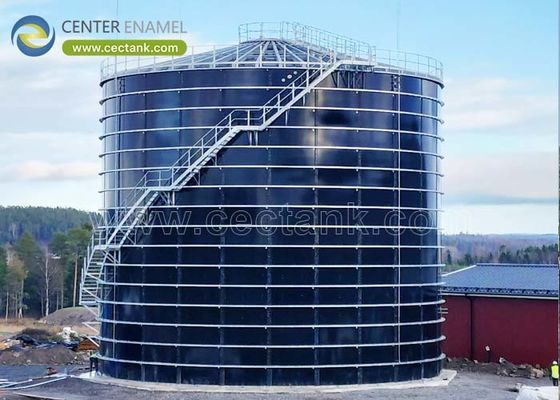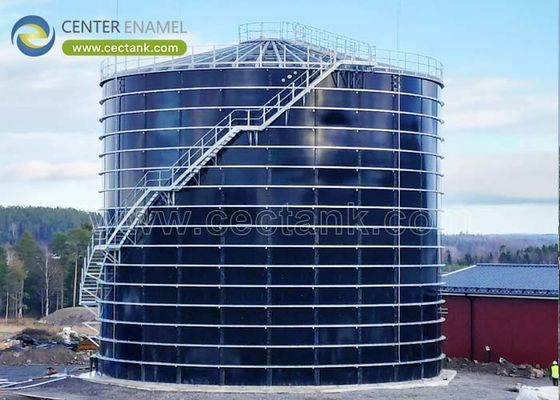-
Glass Fused To Steel Tanks (465)
-
Stainless Steel Tanks (434)
-
Fusion Bonded Epoxy Tanks (469)
-
Galvanized Steel Tanks (321)
-
Aluminum Dome Roofs (1257)
-
Wastewater Storage Tanks (226)
-
Welded Steel Tanks (457)
-
Pressure Vessels (295)
-
Anaerobic Digester (201)
-
Industrial Water Tanks (349)
-
Glass Lined Steel Tanks (180)
-
Bolted Steel Tanks (270)
-
Sludge Storage Tank (115)
-
Biogas Storage Tank (173)
-
Leachate Storage Tanks (133)
-
Agricultural Water Storage Tanks (179)
-
Fire Water Tank (166)
-
Grain Storage Silos (146)
-
Biogas Projects (381)
-
Wastewater Treatment Projects (270)
-
Double Membrane Roof (223)
Glass-Fused-to-Steel Tanks for Anaerobic Digestion: The Optimal Solution for Efficient Organic Waste Treatment
| Place of Origin: | China |
| Brand Name: | CEC TANKS |
| Certification: | ISO 9001:2008, AWWA D103 , OSHA , BSCI |
| Model Number: | J2016012613 |
| Minimum Order Quantity: | 1set |
| Price: | $5000~$20000 one set |
| Packaging Details: | PE poly-foam between each two steel plates ; wooden pallet and wooden box |
| Delivery Time: | 0-60 days after deposit received |
| Payment Terms: | L/C, T/T |
| Supply Ability: | 60 sets per month |
|
Detail Information |
|||
Product Description
Glass-Fused-to-Steel Tanks for Anaerobic Digestion: The Optimal Solution for Efficient Organic Waste Treatment
In today’s world, where waste management and sustainable energy production are becoming increasingly crucial, anaerobic digestion is one of the most effective technologies for processing organic waste. By breaking down organic material in an oxygen-free environment, anaerobic digestion generates biogas, a renewable energy source that can be used for heating, electricity, or even vehicle fuel. However, the performance and longevity of anaerobic digestion systems are heavily reliant on the quality of the tanks used to house this biological process.
At Shijiazhuang Zhengzhong Technology Co., Ltd. (Center Enamel), we have developed advanced Glass-Fused-to-Steel (GFS) anaerobic digestion tanks, designed to provide optimal performance, longevity, and minimal maintenance in the harsh conditions of organic waste treatment. In this article, we explore why GFS tanks are the ideal solution for anaerobic digestion and how they contribute to more sustainable, efficient waste-to-energy systems.
As a leading storage tanks manufacturer worldwide. Center Enamel can provide Glass-Fused-to-Steel (GFS) tanks, fusion bonded epoxy tanks, stainless steel tanks, galvanized steel tanks and aluminum geodesic dome roofs, Wastewater and Biogas Project Equipments for global customers.
| Configuration of Customized Storage Tanks | ||||
| Storage tanks | Volume | Roofs | Application | Design Requirements |
|
GFS Tanks SS Tanks Fusion Bonded Epoxy Tanks Galvanized Steel Tanks Welded Steel Tanks |
<1000m³ 1000-10000m³ 10000-20000m³ 20000-25000m³ >25000m³ |
ADR Roof GFS Roof Membrane Roof FRP Roof Trough Deck Roof |
Wastewater Treatment Project Drinking Water Project Municipal Sewage Project Biogas Project Fire Water Storage Project Oil Storage Project |
Water Supply & Drainage System Seismic Design Wind Resistant Design Lightning Protection Design Tank Insulation Design |
WasteWater Treatment Project Equipment Supply
| Pretreatment Equipment | Resource Utilization System | Sludge Treatment System | Other Equipment |
|
Mechanical Bar Screen Solid-liquid Separator Submersible Mixer |
Gas Holder Boiler System Boost Fan Biogas Generator Torch System Dehydration and Desulfurization Tank |
PAM Integration Dosing Device Screw Sludge Dewatering Machine Slurry Separation Centrifuge |
Sewage Pump Mud Scraper Submersible Sewage Pump Three-phases Separator |
What Is Anaerobic Digestion?
Anaerobic digestion is a biological process where microorganisms break down organic waste, such as food scraps, agricultural residue, or wastewater sludge, in the absence of oxygen. This process produces biogas (primarily composed of methane and carbon dioxide), which can be captured and used as a renewable energy source. The remaining material, known as digestate, can be used as nutrient-rich fertilizer for agricultural purposes.
The anaerobic digestion process occurs within specialized tanks, often referred to as digesters. These tanks must be able to withstand aggressive environments due to the corrosive nature of the organic material being processed, as well as the production of biogas.
Why Choose Glass-Fused-to-Steel (GFS) Tanks for Anaerobic Digestion?
Exceptional Corrosion Resistance
Organic waste, when broken down, generates corrosive byproducts such as acids and gases. Conventional materials like carbon steel are vulnerable to rust and degradation in such an environment. Glass-Fused-to-Steel (GFS) tanks, however, feature a unique coating that permanently bonds glass to the steel substrate, providing a smooth, non-porous surface that is resistant to corrosion.
This corrosion resistance ensures the integrity of the tank over time, even under the most challenging conditions. As anaerobic digestion tanks are exposed to high moisture levels, chemicals, and gases, the durability of GFS tanks minimizes the need for repairs or replacements, extending the tank's service life.
Long-Term Durability and Strength
GFS tanks are known for their impressive durability. The glass coating creates a highly resilient surface that resists abrasion, scaling, and cracking, making these tanks highly reliable over the long term. Unlike traditional welded steel tanks, which can suffer from weld fatigue and other weaknesses over time, GFS tanks provide superior structural integrity.
This robustness is particularly important for anaerobic digestion tanks, which must handle high-pressure conditions, the weight of the digesting materials, and fluctuating temperatures. Whether you are processing small volumes of organic waste or managing large-scale industrial operations, GFS anaerobic digestion tanks are built to withstand demanding conditions while ensuring the continuous, efficient operation of the system.
Low Maintenance Costs
One of the most significant advantages of GFS anaerobic digestion tanks is their low maintenance requirements. The glass coating not only resists corrosion but also prevents the buildup of sludge and biofilm, which can hinder the efficiency of the anaerobic digestion process and require frequent cleaning and maintenance. As a result, GFS tanks are much easier to clean and maintain, reducing downtime and labor costs associated with repairs and cleaning.
This reduction in maintenance needs translates to long-term operational savings. The absence of frequent repairs or coatings reapplication means that the total cost of ownership of a GFS anaerobic digestion tank is significantly lower than other tank types, such as those made of uncoated steel or concrete.
Seamless Integration with Anaerobic Digestion Systems
The design of GFS tanks ensures that they are perfectly suited for anaerobic digestion processes. Their smooth, non-porous interior makes them easy to clean and prevents the growth of bacteria or algae that could otherwise compromise the efficiency of the system. Additionally, these tanks are designed with advanced sealing technology to ensure that gas and liquids remain contained, and biogas can be effectively captured.
GFS tanks can be equipped with various accessories, such as gas collection systems, temperature control units, and stirrers, to further enhance the efficiency of the anaerobic digestion process. Their flexible design makes them a perfect fit for both small-scale operations and large industrial anaerobic digesters.
Environmentally Friendly
The use of Glass-Fused-to-Steel not only provides excellent performance but also aligns with sustainability goals. The materials used to construct GFS tanks are 100% recyclable, contributing to a circular economy. Furthermore, GFS anaerobic digestion tanks play a key role in waste-to-energy systems, which reduce landfill waste and help produce clean, renewable energy in the form of biogas.
By adopting GFS anaerobic digestion tanks, organizations can minimize their environmental impact and promote sustainable waste management practices. Additionally, the tanks’ long lifespan reduces the need for constant replacements, further contributing to sustainability goals.
Cost-Effective Solution
While the initial investment in GFS anaerobic digestion tanks may be higher compared to other tank materials, their long-term performance and low maintenance costs make them an extremely cost-effective solution over the lifespan of the tank. With fewer repairs, lower operational downtime, and reduced cleaning costs, GFS tanks offer a strong return on investment for businesses looking to implement or expand their anaerobic digestion systems.
Applications of GFS Anaerobic Digestion Tanks
Municipal Wastewater Treatment Plants
Municipalities around the world are increasingly turning to anaerobic digestion to treat wastewater sludge and organic municipal solid waste. GFS anaerobic digestion tanks are ideal for these applications, offering reliable, high-performance systems that reduce waste volume and produce biogas for renewable energy generation.
Agricultural Waste Management
The agricultural sector generates large volumes of organic waste, including animal manure, crop residues, and food processing byproducts. GFS anaerobic digestion tanks provide a sustainable solution for digesting this waste, turning it into biogas and nutrient-rich digestate that can be used as fertilizer.
Food and Beverage Industry
The food processing industry produces significant organic waste, such as food scraps, oils, and residues. GFS anaerobic digestion tanks allow food producers to process this waste efficiently, producing biogas and reducing the environmental impact of their operations.
Industrial Effluent Treatment
Many industries generate organic effluent that must be treated before being released into the environment. GFS anaerobic digestion tanks provide an efficient and eco-friendly method for treating industrial effluents, helping to meet regulatory standards while producing valuable biogas.
Why Choose Center Enamel’s GFS Anaerobic Digestion Tanks?
At Center Enamel, we specialize in designing and manufacturing Glass-Fused-to-Steel (GFS) anaerobic digestion tanks tailored to meet the specific needs of your organic waste treatment operation. Our tanks offer:
Exceptional corrosion resistance and durability, ensuring long-term, reliable performance.
Low maintenance costs, reducing operational expenses and downtime.
Customizable solutions to meet the specific needs of your waste treatment facility, whether small-scale or large.
Sustainability by supporting waste-to-energy initiatives and contributing to cleaner, greener environments.
With over 30 years of experience and a global footprint in over 100 countries, Center Enamel is a trusted provider of high-quality anaerobic digestion tanks. Our tanks are engineered to meet the highest international standards, and we work closely with clients to ensure their systems are optimized for efficiency and performance.
The adoption of Glass-Fused-to-Steel (GFS) anaerobic digestion tanks provides an exceptional solution for efficient, sustainable organic waste treatment. Their corrosion resistance, durability, and low maintenance costs make them the ideal choice for both small and large-scale anaerobic digestion systems. By investing in GFS anaerobic digestion tanks, businesses can enhance their waste management capabilities, reduce environmental impact, and generate renewable energy in the form of biogas.
For more information on how Center Enamel’s GFS anaerobic digestion tanks can enhance your waste treatment system, contact us today. Our team of experts is ready to help you design a solution tailored to your specific needs.




